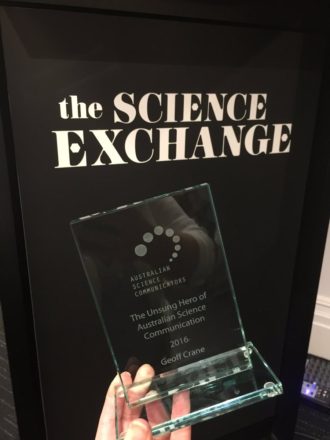Last night at the ASC2017 Conference, Australian Science Communicators announced the Unsung Hero of Australian Science Communication award winner for 2016.
As well as the overall winner, the panel wished to recognise one highly commended finalist in this year’s award.
ASC thanks the judging panel including 2015 Unsung Hero winner Kylie Walker, and Bianca Nogrady for their time in considering all of the very worthy 2016 nominees.
The winner of the Unsung Hero of Australian Science Communication for 2016 is Geoff Crane.
(Photo courtesy of Kate Driver @kmadriver)
GEOFF CRANE is celebrated as the 2016 Unsung Hero of Australian Science Communication for his significant and sustained contributions to science communication.
Geoff is a science communication powerhouse. For many years he has passionately worked behind the scenes to engage Australia in science, including with National Science Week, Questacon and Inspiring Australia.
His recent achievements include over five years of phenomenal work as ‘Mr Science Week’, connecting with millions of people through events, online initiatives and social media. He is instrumental in leveraging both official funding and the considerable goodwill of volunteers and committees around the country. He helps people seeking to be involved with National Science Week to feel engaged, inspired and excited. His work extends far beyond the Week itself – Geoff works tirelessly year-round to promote and support science engagement events across the nation.
Through his active leadership, Geoff has helped transform National Science Week from a loose collective of volunteers into Australia’s biggest festival. He has brought professionalism to the event, giving it a public image and impact that extends exponentially beyond the direct funding it receives. He is as supportive of a small regional science events as he is of capital city extravaganzas.
Geoff promotes excellence in science communication and networks extensively to connect science communicators working in many different disciplines and physical locations. He is generous in sharing his time, knowledge, networks and energy and is well-known and highly respected in the science communication community.
Despite 25 extraordinary years of work in science communication, Geoff would never seek the spotlight. The judging panel described Geoff as an ‘unassuming mastermind’, whose important contributions to the field of science communication and engagement include boosting the confidence and prominence of other science communicators and building the success of countless initiatives across the country.
It is for these reasons that the panel considers Geoff to be the Unsung Hero of Australian Science Communication in 2016.
The Highly Commended finalist in the Unsung Hero of Australian Science Communication for 2016 is Kylie Andrews.
KYLIE ANDREWS is honoured as a Highly Commended Finalist in the 2016 Unsung Hero of Australian Science Communication for her significant contributions to science communication and citizen science.
Kylie is the hidden, unstoppable driving force behind the major citizen science projects that have enthused the Australian public during National Science Week, every year since 2009, with great success. She is also an experienced science journalist with many years of writing for ABC Science online.
Kylie’s extensive work with ABC Science has included a focus on citizen science projects, which in recent years have also been supported by Inspiring Australia and National Science Week. She has worked tirelessly to create a diverse array of citizen science projects, delivering leading initiatives that engage a wide audience while employing scientific rigour and facilitating genuine scientific progress. As the sole driver of these projects, she has become a leader in citizen science – an expert in every aspect, from concept, to design, to implementation and effectiveness, to marketing and audience engagement.
Kylie has been instrumental in combining ABC’s ground-breaking role in adopting online technologies with citizen science, to create programs with a huge scope, great appeal and connection with diverse audiences. Her work is unique in Australia.
Kylie is also the creator behind the National Science Week website, which has established a significant and far-reaching presence for this major annual science communication festival, engaging audiences, promoting and connecting the many activities being delivered across the country, and the people who hold them.
She is the quintessential ‘behind the scenes’ magician, achieving a huge reach with imaginative approaches. Her work not only inspires millions of people to meaningfully contribute to science but also genuinely contributes to scientific research – Kylie applies a rigorous eye and works with scientists on real problems that are being solved in real time.
It is for these reasons that the panel wishes to recognise Kylie as a Highly Commended finalist in the Unsung Hero of Australian Science Communication in 2016.

